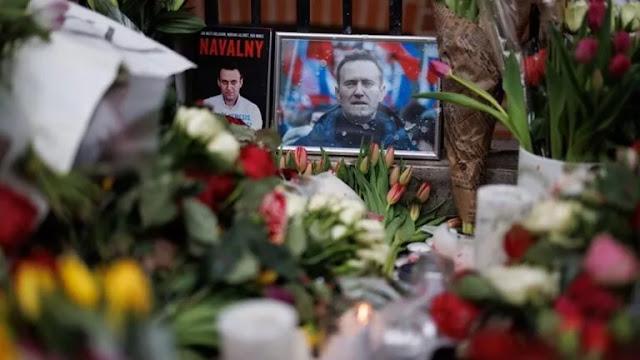Filenews 19 February 2024 - by Marc Champion
Alexei Navalny, who according to Russia's prison service died on Friday, was a man both ambitious and spectacularly brave, punished for acts that would have been rewarded in other societies. All those in the West who admire Vladimir Putin for his power and illiberal values should take a serious look, because Navalny's fate is the true face of Kremlin rule.
Navalny had been arrested countless times for political protests, poisoned with a nerve agent and sentenced to life in prison on charges of "extremism". In fact, he was punished for daring to oppose and expose Russia's ruling kleptocracy. He had already exceeded his life expectancy, not because he was ill or, at 47, old, but rather because of the abuse to which he was subjected in prison. He may well have fainted during a walk in the penal colony where he was being held in northern Siberia, according to prison authorities, but it is certain that his death was caused by what he had suffered in the past.
Life expectancy... survival of oppositionists
As a victim, Navalny was by no means "unique." Boris Nemtsov, one of the few genuine opposition politicians to survive long under Putin, was assassinated while crossing a bridge near the Kremlin in 2015. Many countries have introduced so-called Magnitsky laws in response to the 2009 murder of Sergei Magnitsky in prison. The latter was a tax consultant who uncovered a massive fraud by the same Russian Interior Ministry which later fabricated charges to imprison him. A list of all the Kremlin critics, journalists, politicians, activists and "troublesome" businessmen shot, poisoned or dropped from windows in Putin's Russia is long.
And yet, Navalny was special, as he seemed capable of getting under the skin of the Kremlin like no other. If he had ever been allowed to run in elections, he would almost certainly have lost to Putin, his enemy. He was not a liberal, in the "woke" sense of the word. In the early stages of his political activism, he had marched with nationalists and neo-Nazis, whom he saw as allies, because at the time – long before the invasion of Ukraine – they too opposed Putin.
What made Navalny dangerous to the Kremlin was that he had the extraordinary degree of courage needed to investigate and expose the secret wealth of the nation's most powerful men, plus he had the genius to use modern media to broadcast their alleged thefts in a country in which there is no free press. Navalny was poisoned while flying in Russia and nearly died in 2020. He was taken to Germany for treatment, where it was found that the agent used against him was a military-style nerve agent called Novichok, which has been used in other assassination attempts on Russian dissidents, including in the UK.
Navalny's YouTube film about corruption in the Kremlin, Palace for Putin, was shot while he was in Germany recovering. However, he only released it after he returned to Russia in 2021 – "because we don't want the main character of this film to think we're afraid of him."
Once landed in Russia, Navalny was arrested, continued his activism from prison, was constantly placed in solitary confinement, and then transferred to a penal colony in northern Siberia in December, when he looked increasingly weak. He is now dead. The palace for Putin was viewed more than 129 million times — and this was just one huge building on the Black Sea coast, which the Kremlin has denied belongs to Russia's president.
Then there was the revelation that Putin (allegedly) also owns a $700 million superyacht, while vast tracts of land, according to Navalny, are reserved for former president and former Russian prime minister (now deputy chairman of the country's Security Council) Dmitry Medvedev.
Effect
In a kind of quantitative assessment of the impact of Navalny's activity on Russia, the Levada Center, Russia's most independent polling agency, asked in 2021 how many people had seen the "Palace for Putin" and whether it had changed their attitude towards the president. More than a quarter of the country, 26 percent, had watched the video, according to the poll. Of those, 17 percent said their view of Putin had worsened as a result, 77 percent said it had no effect, and 3 percent said they now appreciated him more.
Like most dissidents in Russia, Navalny was not a saint. He stood out, however, for the sheer bravery of his decisions, especially for his return to Russia after a clear assassination attempt on him by the state. I say it clearly, not only because the Novichok is a chemical weapon available only to Russian state institutions, but also because Navalny recorded the call with one of the suspects that he put the poison in his underwear while he was traveling. The man confirmed what he and his colleagues had done.
Navalny collaborated on a documentary about himself while in Germany. Asked by the director what message he would have for the Russian people if they died, Navalny said it should be this: "Evil can only multiply if good people do nothing, so don't be idle."
Navalny was never idle, even when he had already experienced the full extent of the regime's plans for him. He may not have been afraid of the Kremlin, but the Kremlin was obviously afraid of him.
Performance – Editing – Text Selection (2019 – 2024): G.D. Pavlopoulos
